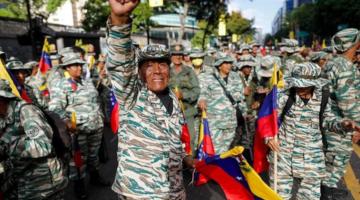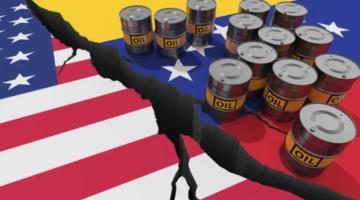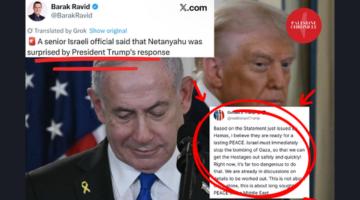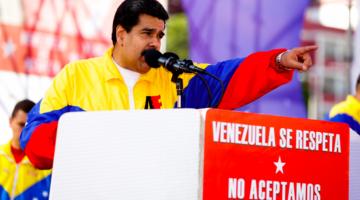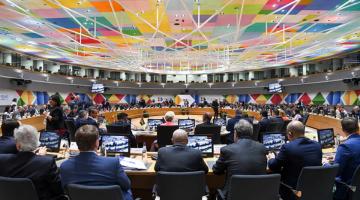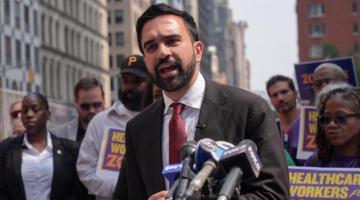Washington has mobilized warships and aircraft to the Caribbean region. (army.mil)
Solidarity activist and analyst Roger Harris takes stock of the rapidly escalating US military threats against Venezuela.
Originally published in Venezuela Analysis.
Spoiler alert – it already has. This is not a glib answer but a comment on the nature of the conflict. The US mission to wrench Venezuela’s Bolivarian Revolution out from its roots has a quarter-century pedigree. Stick around to the end of the article for an assessment of the likelihood of an overt military attack inside Venezuela. But first a little historical context.
Regime change has failed…so far
In 2002, a US-backed military coup temporarily ousted Hugo Chávez. A mere 47 hours later, the people of Venezuela spontaneously arose and returned their rightfully elected president.
Washington has persistently interfered in the internal affairs of Venezuela, pouring millions of dollars to rig elections. Yet, the perpetually divided and unpopular US-fostered opposition is more isolated and discredited than ever.
Undeterred by its 2002 failed coup, the US has repeatedly sponsored attempts to achieve by violence what they could not do by interfering in Venezuelan elections. In 2020, the so-called “Operation Gideon” was designed to kidnap President Maduro. Derisively dubbed the “Bay of Piglets,” this coup attempt along with numerous others failed. Local fisher folk apprehended the mercenaries.
Among the many diplomatic efforts at regime change by Washington, the Lima Group was cobbled together in 2017. The cabal of 11 rightwing Latin American states and Canada aspired to facilitate “a peaceful exit” to oust Venezuelan President Nicolás Maduro. By 2021, nearly half of the Lima Group countries had elected progressive governments and that diplomatic offensive fizzled.
Meanwhile in 2019, the US anointed unknown 35-year-old Juan Guaidó as “interim president” of Venezuela. On December 21, 2022, his own opposition found the puppet so toxic and corrupt that they gave him the boot.
Previously in 2015, Barack Obama certified that Venezuela was an “extraordinary threat” to US national security. He imposed unilateral coercive measures designed to destroy the Venezuelan economy. Euphemistically called “sanctions,” this form of collective punishment is illegal under international law. Regardless, each subsequent US president has continued and to varying degrees augmented the economic warfare.
Combined with oil commodity prices cratering – the source of almost all of its foreign earnings – Venezuela experienced the largest peacetime economic contraction in recent world history. Inflation reached 2,000,000% and the days of the Bolivian Revolution appeared to be numbered. However by 2023, in a heroic effort under the resolute political leadership of President Maduro, Venezuela reversed the economic freefall and recorded a 5% GDP growth rate, which has continued in a positive direction.
US trapped in its imperial imperative
Without further detailing the multitude of illegal US regime-change machinations, it is sufficient to say that the very successes of the Venezuelans have forced Uncle Sam to escalate the conflict. Forced because, as an imperial power, the United States is structurally driven by its inherent pursuit of hegemony – rule over all potential challengers. This compulsion is codified in its official security doctrine of “full-spectrum dominance.”
Venezuela has indeed been a challenge. Even before Hugo Chávez was elected in 1998, former President Carlos Andrés Pérez nationalized the country’s oil reserves – the largest in the world – in 1976. Chávez increased state control over the oil industry and expropriated international oil company assets.
Chávez’s precedent of using the country’s natural resources – including Venezuela’s substantial reserves of natural gas, iron ore, bauxite, gold, coal, and diamonds – to fund social programs, rather than handing them over for private profit, is anathema to the US. Not only does the imperium lust over the oil for its own corporations, but control of such strategic resources are geopolitically critical for maintaining global dominance.
Venezuela has also been a leader in promoting regional unity that is independent of the US, forging alliances such as CELCA and ALBA. It is a close ally with Nicaragua and Cuba, also on the US enemies list. Through OPEC, Friends in Defense of the UN Charter, and other initiatives, Venezuela has encouraged Latin American unity with Africa and Asia. Venezuela has “strategic partnerships” with China and Russia and is close to Iran. A champion of Palestine, it broke relations with Israel in 2009. Venezuela also supports an emerging multilateral international community.
For all these “offenses,” the Bolivarian Revolution’s existence is insufferable to the Yankee hegemon…to be crushed.
The guardrails are down
Trump is operating with virtually zero institutional constraints. A mere five congressional Democrats recently awoke from their slumber to send a letter meekly suggesting that presidential “powers are not limitless.” But the Senate just voted against a war powers resolution to constrain attacks on Venezuela.
Democrat representatives on the House Foreign Affairs Committee posted on X: “Trump and Rubio are pushing for regime change in Venezuela. The American people don’t want another war.” However, their colleagues in the Senate provided a unanimous mandate to the very same Republicans who ran on a “Maduro must go” platform. They rushed to do so, without debate, in the very first hours of the new administration.
Within the bipartisan consensus for regime change in Venezuela, the differences are cosmetic. The Democrats would prefer to overthrow the sovereign state “legally.” Truthout reports that some senior Democrats warned “fellow members against opposing Trump’s war, saying that it would be tantamount to throwing their support behind Maduro.” If the Republicans precipitate an attack, the Democrats at best will agree with the ends but not the means.
The follow-the-flag press prepares public opinion for a strike
On September 26, NBC News reported “from the White House” that the US is planning strikes inside Venezuela. The one-minute video is actually of a guy standing in the street outside the White House, claiming that he had chatted with four unidentified “sources.” Subsequently, this unsubstantiated scoop went viral, picked up by almost every major corporate press outlet.
The New York Times editorialized: “Mr. Trump has grown frustrated with Mr. Maduro’s failure to accede to American demands to give up power voluntarily and the continued insistence by Venezuelan officials that they have no part in drug trafficking.” What doesn’t occur to these Pentagon scribes, is that neither has Mr. Trump shown any enthusiasm for giving up power voluntarily or even admitting to the documented conclusion by the US in drug trafficking.
In one of its typical propaganda pieces trying to pass as a news story, the Times tells us “what we know” about Washington’s offensive against Venezuela: “the endgame remains opaque.” Apparently, they don’t know jack, because the endgame is regime change. In remarks aimed at Venezuela, Mr. Trump threatened: “We will blow you out of existence.”
All the elements are in place for a strike inside Venezuela
- Diplomatic relations with Venezuela have been broken since 2019.
- In 2020, the US indicted President Maduro for narco-terrorism, placing a $15 million bounty on him, subsequently raised to $25m and now $50m.
- On January 20, Trump took office. Executive Order 14157 declared a “national emergency” and designated international drug-trafficking groups as “foreign terrorist organizations” (FTOs) and “specially designated global terrorists,” citing authority under the Alien Enemies Act.
- By February, Secretary of State Marco Rubio argued that FTOs posed an “existential threat” and laid the groundwork for treating cartels allegedly linked to President Maduro as enemy combatants.
- In May, the administration opened the path to use military force against FTOs.
- Then in July, a “secret directive” authorized military operations against FTOs at sea and on foreign soil.
- By August, the US launched a massive naval deployment off the coast of Venezuela. By October, troop deployment reportedly reached 10,000.
- On September 2, the US blew up the first of four or five alleged drug boats in international waters off of Venezuela, resulting in extrajudicial murders of the crews.
- By mid-September, the Pentagon notified Congress under the War Powers Resolution that US forces were engaged in a “non-international armed conflict” with drug cartels.
- This was followed on October 1 by the Defense Department’s “confidential memo” and more congressional briefings that the US was engaged in armed conflict.
- Trump then terminated the last back-channel diplomatic contacts with Venezuela.
If the “international community” can’t halt the ongoing US/zionist genocide in Palestine, the Yankee juggernaut faces little effective resistance in the Caribbean. A US attack inside Venezuela is imminent!
Roger D. Harris, a founding member of the Venezuela Solidarity Network, is on the board of the Task Force on the Americas and on the secretariat of the US Peace Council.


